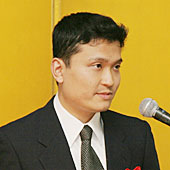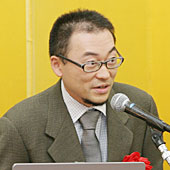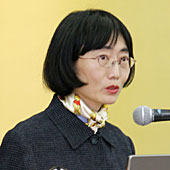 Prizewinners
Prizewinners
- The History of Asian Rural Institute
-

1948 Tsurukawa Gakuin Rural Institute was established in Tokyo (Theological school for nurturing rural pastors). 1959 The conference of the Christian Council of Asia (CCA) Kuala Lumpur, Malaysia requested Japanese churches to train rural pastors in Asia. 1960 Based on the CCA’s request, Southeast Asia Course for Rural Pastors was started in Trurukawa Rural Institute, supported by the World Council of Churches. Rev. Dr. Toshihiro Takami became the first chairman of this course. 1973 The Southeast Asia Course for the Rural Pastors was transferred to Nishinasuno, Tochigi Prefecture and became independent and newly established as the Asian Rural Institute. Rev. Dr.Toshihiro Takami was the first Chair of the ARI Board and the first director. 1975 Accepted trainees for the Tochigi Prefecture Oversea Technical Training Program (until 1981). 1975 Co-sponsored "Campaign for Starvation in Asia" with the National Christian Council (NCC) (until March 1976). 1976 Received the first participants Africa and the Pacific Islands. 1978 The name of the school was changed from "Southeast Asia Rural Leaders Training Center" to "Asian Rural Institute - Rural Leaders Training Center". 1983 Held the 10th anniversary ceremony. 1989 Set up advanced training course. 1993 Held the 20th anniversary ceremony. 1994 Rev. Dr. Toshihiro Takami, Founder of ARI, reveived the Eiji Yoshikawa Culture Award. 1995 MC-ARI Santa Rita Training Center was established on Negros Island of the Philippines as a joint project with a Catholic organization in the Philippines. 1995 Officially began training for Japanese participants. 1996 Dr.Toshihiro Takami, Founder of ARI, won Ramon Magsaysay Award for International Understanding of the Philippines. 2000 Held the " Grassroots Peace Making " conference in Kerala State of South India sponsored by the Niwano Peace Foundation. 2001 Won the 13th Mainichi International Fellowship Award. 2003 Held the 30th anniversary ceremony As of March 2006, 1076 graduates in 52 countries are working for the betterment of their rural communities throughout the world.
- Masato Hiwatari
-
 Title of Dissertation
Title of Dissertation- "Functions and Roles of the Customary Economy in Uzbekistan:Community-based Structure of a Mahalla with Social Ties in Andijan"
In March 2001, Masato Hiwatari graduated from the College of Arts and Sciences, the University of Tokyo. In March 2003, he gained his M.A. from the Department of Advanced Social and International Studies, Graduate School of Arts and Sciences, the University of Tokyo and in April of the same year, he started his doctorate degree at the same institution. From 2003 to 2006 he has served as a Research Fellow of the Japan Society for the Promotion of Science. In March 2006, he completed his doctorate course at the Department of Advanced Social and International Studies, Graduate School of Arts and Sciences, the University of Tokyo and obtained his doctoral degree (arts and sciences). Since April 2006, he has been attending the Graduate School of Arts and Sciences, the University of Tokyo as a Research Student.
- Rintaro Ono
-
 Title of Dissertation
Title of Dissertation- "Marine Exploitations and Subsistence Strategies in the Celebes Sea: An Ethno-Archaeological Approach for Area Studies"
Rintaro Ono gained his B.A. (History) from Sophia University in 1998. He gained his M.A.(Area Studies) from Sophia University in 2000, and continued onto his doctoral course at the same institution as the Research. Fellow of Japan Society for the Promotion of Science (JSPS), and left the program while attaining necessary credits in 2003.He served as the Research Fellow of JSPS (PD) at the National Museum of Ethnology (2003-2006), and gained his Ph.D. (Area Studies) from Sophia University in March 2006. He is now a Visiting Research Fellow at the National Museum of Ethnology, and the Institute of Asian Culture, Sophia University.
- Subin XU
-
 Title of Dissertation
Title of Dissertation- "The Modernization of the City and Architecture in China and its Relationship to Japan"
Subin XU received Ph.D both from Tianjin University (China in 1992) and the University of Tokyo (Japan in 2005). She worked as a Lecturer at Tianjin University and Tsinghua University, in China. She was a Visiting Research Scholar in International Research Center for Japanese Studies, Institute of Oriental Culture, the University of Tokyo and Institute of Industrial Science, the University of Tokyo. Since September 2006, she has served a Professor, Tianjin University in China. Her research field is Industrial History, Urban and Architectural History between Japan and China, conservation of Cultural Heritage. She published Japanese Studies on Chinese City and Architecture (China Water Power Press). She awarded 10th place in the Surveys and Research Prize (East Japan Railway Culture Foundation), The Society Prize (The City Planning Institute of Japan), YAMADA KAZUIE Prize (The MAEDA Engineering Foundation) to name but a few.






